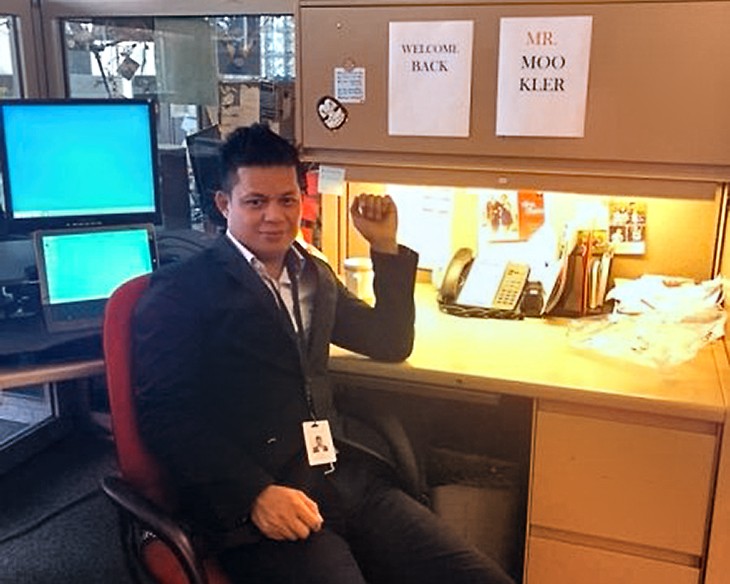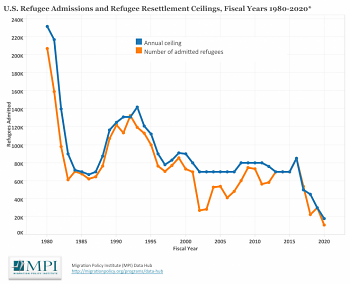“My name is Moo Kler. I came as a refugee. I was born in Burma and moved to Thailand when I was little, maybe two or three years old. We fled from the government and had to move to a refugee camp; we then became refugees. I lived in a refugee camp for about 16 years. In 2008, I applied in a U.S. refugee resettlement program. It took me almost two years to get approved, and in Nov. 10, 2009 I arrived in Michigan.”
Kler’s story is among the many stories of people who, due to necessity, flee from their home countries seeking a new beginning where famine, war and political instability will no longer be part of their life. On March 17, The Refugee Act of 1980 was signed and this year, we celebrate its 40th anniversary.
Michigan has played a big part in the story of refugee resettlement. Over the past decade, it has been ranked fourth on the list of states that receive the highest number of refugees in the country. In addition, Michigan’s population declined by 112,000 from 2006 to 2016. In that window, more than 35,000 refugees were resettled in Michigan, which helped mitigate the decline. Hundreds of those refugees have been resettled in Grand Rapids where, in 2017, along with the number of immigrants, consisted of about 10.5 percent of the total population (City of Grand Rapids).
Annually, refugees are estimated to contribute up to $295 million to Michigan economy. This is the result of the work of various local organizations, such as Bethany Christian Services, that have been key in providing direct services for incoming refugees.
“I came as a refugee and had a case worker from Bethany Christian Services," Kler recalls. “They helped me in almost everything; from setting up my apartment, to finding a job and getting my documents. I started working through Bethany Christian Services after a week. I started as an entrepreneur and six months later I got hired as a case aide.
Now my role in Bethany Christian Services is as an employment specialist; we serve refugees for five years. In those five years, we help them find a job, help with transportation, documentation, interpreters, everything… and then we follow up and keep contact.”
Yet, in 2019, the number of refugees allowed into the country fell to 30,000 – the second lowest after 2002, when the ceiling number of refugees was 27,000, after 9/11. In 2020, this number has dropped to 18,000, beating the record. Now, a proposal for a new historic low has been announced for the fiscal year of 2021; the Trump administration intends to admit a maximum of 15,000 refugees to the United States.
In the past decade, Michigan has been the fourth largest location for refugee resettlement - called a “Haven” by the New York Times - with Grand Rapids being an important site. Due to the growing demand for refugee settlement services, different organizations dedicate themselves to providing assistance to newcomers seeking a new life. Now, the number of refugees being relocated to Grand Rapids has dropped, and organizations like Bethany Christian Services suffer from the turndown in numbers.
Despite the huge drop in numbers, Bethany Christian Services was expecting 70 arrivals this past March which is the biggest number they would ever have in the organization in a single month. Sadly, Bethany only had 27 new arrivals in March due to a temporary shutdown of refugee resettlement caused by COVID-19. This year, the organization has only resettled 140 refugees which is far lower than what they expected.
Stacey Vos, Supervisor of their Matching Grant Program, states, "It’s not something we expected to continue but we were super excited because most of these refugees are rejoining their family members here in the United States. They are related to refugees that have already been resettled by Bethany Christian Services. It’s really awesome to go to the airport and see them reconnect with their families. Moo Kler was doing that.”
Kler is wearing a black suit with a light button-down shirt, and loafer shoes with clean lines. He sits straight and opens a nostalgic child-like smile as he recalls new arrivals the organization had. “I meet them at the airport, take them to their apartment and show them their new place. We provide them with classes on the culture of the country and racial diversity as well as job trainings. We provide almost everything; this is our job here.”
And yet, this year has hindered these services in more than one way.
This year’s U.S. Annual Refugee Resettlement Ceiling has dropped in response to the surge of asylum seekers crossing the border from Mexico. In September of 2019, the White House imposed new caps on incoming refugees, as part of a full-court press to lock down borders and generally reduce the number of foreign nationals, authorized or not, living in the country. Adding to that, COVID-19 caused a temporary shutdown of refugee resettlement, resulting in a total number of less than 9,200 resettled refugees in the U.S. as of August 31, according to the Refugee Processing Center.
The number of refugees allowed into the United States has not been this low in over a decade: 18,000 which contrasts with at least 1.4 million refugees that, in 2019, were predicted to be in urgent need to be resettled in the year of 2020. The United States was first on the list of countries that receive refugees until 2019. For this reason, several local organizations dedicate themselves to providing refugee resettlement services and they receive funding from the government to do so.
Organizations like Bethany Christian Services are among the most affected by the decrease in numbers, as their funding is based on the number of people that are enrolled in their resettlement program.
“When our arrivals decrease, then our funding is also decreased," Vos explains. "So that’s when we go out into the community and try to get support from them as well. Because even though our arrivals are slow, we are still supporting a huge number of clients and we serve them for up to five years. We still have an abundance of clients that still need our services.”
The refugee ceiling for the 2020 fiscal year was set to 18,000. This expired on Wednesday, October 1, when the Trump administration proposed a reduction of the refugee cap for the 2021 fiscal year to 15,000; which is the lowest in U.S. history.
This fluctuation in numbers does not cause a unilateral impact. The change in the presidential policy affects different parties, including employers. Many employers in Grand Rapids refer to Bethany Christian Services and want this number to be increased. “They say that they cannot survive without refugees”, Kler stated. “Refugees are not picky because they need money and have to pay their bills. Many have kept their job for over 10 years now.”
According to the New American Economy, “Refugees earned more than $77 billion in household income and paid almost $21 billion in taxes in 2015” with a disposable income of $56 billion to contribute to the U.S. economy.
Both Vos and Kler have been working with the refugee resettlement program for 10 years. When asked how the program has impacted their lives, a series of words came to mind: Tenacity, inner strength, diversity, joy. “If I’m having a bad day, I come to work" said Vos. "The refugee experience is one of such tenacity. I don’t think people actually realize how difficult it is to actually get into that process. My clients here are so motivated and have so much inner strength.”
Bethany Christian Services is also present in their Thanksgiving tables, where stories of refugees who have succeeded in their new lives echo in pride. “After one year, they buy a new car, after four or five years they buy a house" Kler said. "I know stories of people who have been in Michigan for less than seven years and have already paid out their mortgage.”
And yet, the future is uncertain. Things change year to year but they may change in a matter of days. On October 1, the State department announced a proposal that the refugee resettlement ceiling for the Fiscal Year of 2021 be set at 15,000. Chris Palusky, Bethany's President and CEO, responded to this proposal on a statement released on Bethany's website. Representing Bethany Christian Services, he advocates for "a refugee ceiling of at least 95,000" and emphasizes the need to prioritize families. In his words,"With the planned refugee allocations, we urge the Trump administration to prioritize family reunification... We have the ability to reunify families, protect people from persecution, and alleviate suffering for so many lives."
Bethany Christian Services is currently funded through the Office of Refugee Resettlement and that funding comes both through the state of Michigan and their affiliate, Churchwood Service. The State funding is based on the number of people that are assisted through their resettlement program. It decreases as the number of people decreases. The refugee resettlement program is on hold until the President, authorized by Congress, signs the Presidential Determination for the fiscal year of 2021. Bethany Christian Services also relies on private donors and the contribution of fundraising.
Given the diversity of their programs, their response to this new policy - in addition to advocating for higher refugee resettlement ceilings - is to support this fluctuation through their other programs. Their employment program, healing center for survivors of torture and trauma, and intensive medical case management program are examples of activities that balance the low arrivals.
Kler still has questions. “I don’t know why they decreased the number of refugees. We came here as refugees to support the Constitution, to make America great again.”
Even with fewer people coming in, their work does not stop; current clients still need their services.
They create a chain of support. As Kler points out, “This is our job”.
The Rapidian, a program of the 501(c)3 nonprofit Community Media Center, relies on the community’s support to help cover the cost of training reporters and publishing content.
We need your help.
If each of our readers and content creators who values this community platform help support its creation and maintenance, The Rapidian can continue to educate and facilitate a conversation around issues for years to come.
Please support The Rapidian and make a contribution today.

